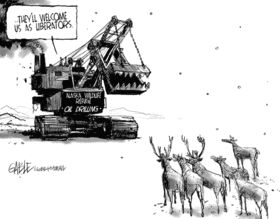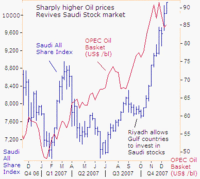Think of this as Volume 11, Number 7 of A-Clue.com, the online newsletter I’ve written since 1997. Enjoy.
The most frustrating aspect of this whole decade is how we’ve gone to war against the wrong enemy, using the wrong means. (Cartoon from the Toronto Globe & Mail.)
Advocates of our present course go on-and-on about radical Islam, about evil-doers, about how we must confront them militarily, over there, so we won’t have to do so over here.
There is so much wrong with that sentence it’s hard to see where to begin. But let’s try.
First, the enemy. It’s not Islam, radical or otherwise. Islam is a means to an end. If we did not need oil we would care a lot less about the Middle East, and it’s very likely Islam could start caring less about us.
It’s a lot more like the South in the Civil War. Why are you fighting us, the Union man asked. Because you’re over here, the Confederate replied. Slavery was the economic model behind the talk of state’s rights. In the same way, oil is the economic model behind all this talk of Jihad, and a clash of civilizations.
Oil should be our enemy. Reduce our need for oil and everything else gets easy.
Second, the means. We have been using military means exclusively. And our military rides on a sea of oil.
Whether we’re "winning" or not, we’re losing because of the means we’re employing.
Our Armed Forces have a role to play, but our chief weapons are not
being engaged. Our priorities are upside-down. Only by focusing our economy,
our invention, and our example in the real fight can we hope to make
progress.
When I talk about a War Against Oil, I’m not talking about
sending troops. I’m talking about exerting all our national energies on
eliminating the need for oil, and the need for anything related to oil.
Once you see the frame correctly, as an economic struggle which must
be won, as an absolute priority which everyone must engage in, the
right policies start to fall out and the wrong policies start to
disappear.
There are several reasons to apply the term War to this economic struggle:
- To set the priority as an absolute, so anyone who questions the priority becomes a traitor to a cause.
- To enable government intervention in that market, which must happen
if we’re to remain focused on the long-term goal rather than the
short-term price of oil. - To force crooks out of the market, by branding them as war profiteers.
- To maintain support for the necessarily wrenching changes which this struggle entails.
The War Against Oil, in other words, is a frame. It’s a way
to understand what must be done, and how it must be done, in order for
things to improve.
When you start fighting the right war, against the right enemy, and
in the right way, you get new policy choices, and a lot of what we’re
now doing starts to look as stupid as it in fact is.
Buying a smaller car, moving closer to your job, and reducing your
carbon footprint become patriotic. Maintaining troops in the Middle
East indefinitely becomes a waste of resources.
Managing this changed frame will be a continuing problem, which is one reason why we need to deploy all our weapons:
- Diplomacy has to be deployed, not only in the Middle East but with Europe, with China, and with India.
- Cultural weapons must be deployed, aimed at re-establishing relationships with people.
- Economic weapons must be deployed, a complete transformation of
incentives aimed at creating the hydrogen economy and re-deploying
assets now being used for hydrocarbons. - Police weapons must be deployed, too, to reduce the rip-offs the new boom will generate.
- Rhetorical weapons must be deployed, to keep popular attention focused on the goal and maintain support for the policy.
- Propaganda weapons must be deployed, for the same reason, in the mass market, not only in the U.S. but around the world.
What we’re talking about is a New Deal in many ways. A new economic deal, a new cultural deal, a new political deal, not just within our country but around the world.
A good example of the reason for this frame lies in one of the greatest frauds of our time, the ethanol fraud.
A lot of powerful economic interests, both growers and processors,
pushed the idea that ethanol from corn or other sources could solve our
"addiction" to oil.
But it turns out ethanol is worse
for the environment than oil is. Once the cost of land use changes are
added to the equation, ethanol winds up giving you a net loss on
greenhouse gases, not a gain.
I always thought ethanol was a wrong turn
anyway. Ethanol is a hydrocarbon. It has a different source, but it’s
still a hydrocarbon. This means it competes directly with oil in the
market. It requires that we maintain the present oil infrastructure. It
delays needed changes in transit technology.
Trouble is, closing the ethanol capital markets means an
even-greater flood into solar and geothermal, where there may currently
be too much investment. First Solar does not need a P/E double that of Google. I don’t know whether a company like U.S. Geothermal is a good investment or a scam.
An awful lot of attention needs to go into identifying good
alternative energy investments, into basic technologies for solar cells
and wind, into increasing efficiency and reducing costs. When Google
says it wants to cut the cost of renewable energy to less than that of coal it’s
saying the right things. But there’s not enough opportunity there,
right now, for even a single company to expect a return on.
We need more opportunity. And as that opportunity appears we need
to research each new technology to maximize the positive impact of
capital, and maximize new supplies.
I would love to get involved in this work, full-time. I would gladly
quit everything else I’m doing and plunge into this. But there isn’t
even enough capital out there to hire me, because we haven’t made this
a priority. And once that capital starts to flow the needs will grow
far beyond me, very quickly — I don’t scale past one person, living 24
hours in each day.
My point here is we need to make a complete U-Turn. We need to
change our frame, change our focus, change our choice of weaponry,
while maintaining the same sense of urgency the Bush people have given
since 9/11 to all their projects.
The War Against Oil is a war we can win, not only on our own behalf
but on behalf of the world. It will take years to turn this boat
around, but a change in our frame is a necessary first step in making
that happen.














